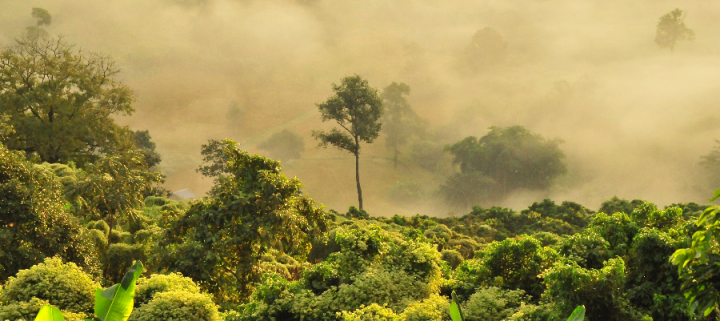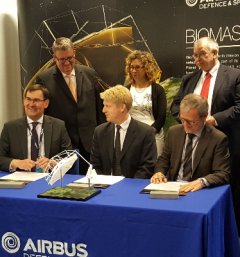Forests, landscapes and agriculture
We have pioneered research in process-based modelling, data assimilation and remote sensing of forests. Our work has underpinned the development and implementation of national and international policies to reduce carbon emissions from deforestation and forest degradation.

Did you know?
We have helped protect and restore up to 300 million hectares of tropical forests by improving satellite monitoring and improved estimates of biomass of tropical trees.
We introduced the first global mapping of C residence times for vegetation pools.
We determined climate controls on tundra biomes, continentally diverse fire-climate-savannah relationships and quantified the surprising floristic turnover of dry forests.
We have pioneered the use of radar remote sensing techniques to determine above-ground biomass and biomass change.
The role of forest biomass
Forest biomass is a major pool of carbon (C) in the Earth system.
It is a strong indicator of local biodiversity. It also provides timber, fuel and other products that support society and its well-being.
Our globally leading research in process-based modelling, data assimilation and remote sensing of forests has also made it possible to map and interpret changes in forest carbon and provide this information to support policy development and decision making from local to global scales.
Pioneering process-based modelling, data assimilation and remote sensing
Our researchers have combined biomass data and models to develop new tools to accurately monitor savannas and dry forests, and quantify carbon stock changes and emissions.
To make the best of the new data flowing from the remote sensing methods developed at the University, we have also pioneered data assimilation.
With data assimilation, we are able to provide state-of-the-art estimates of ecosystem dynamics that combine the new data sources with carbon cycle modelling. This advance allowed us to show, for the first time, how repeated biomass data can be used to calibrate and improve terrestrial C models.
Helping the world reduce carbon emissions
We have built international partnerships to support national agencies reporting and forecasting greenhouse gas budgets required by the UN Paris Climate Agreement.
In addition, we support NGOs to influence land-use policy in multiple countries and the development of forest policy and subsequent implementation to meet international reporting requirements for the United Nations.
Through product development, we are also enhancing the growth of UK environmental businesses and across the globe. For example, our work on biomass mapping coupled to advanced diagnostic carbon cycle modelling has supported UK industry to develop new spatial products and services for forest sustainability.
Highlights
You can find out key information by clicking on each heading below:

Biomass mapping advances using radar and carbon cycle model diagnostics from our researchers have influenced space and Earth observation strategy and investment decisions. Our work and advice are significantly influencing the European Space Agency's mission decisions on monitoring forest biomass change.
Professor Mathew Williams serves on two Mission Advisory Groups for the European Space Agency (ESA) – Biomass Earth Explorer and CHIME.
BIOMASS satellite mission
Our team developed and delivered the supporting case for the Earth Explorer BIOMASS satellite mission in 2013, after advising the European Space Agency (ESA) on mission development since 2009.
The mission, selected in 2013, is the first-ever ESA forest-specific monitoring mission, with a budget of EUR420,000,000 to monitor forest biomass change. Our work and advice were major influences on the ESA's decision to allocate GBP 192,000,000 to commercial company Airbus UK to build the satellite in the UK. The satellite is currently under construction and due to launch in 2023.
The BIOMASS mission will determine the amount of biomass and carbon stored aboveground in tropical forests over five years from 2023, at 4 ha (0.04 km2) resolution. With repeated mapping every nine months, BIOMASS is the first satellite mission in space for P-band radar, uniquely capable of monitoring the densest tropical forests. Our research provided a critical starting point to the mission design and the basis of all downstream mission requirements.
You can find out more about the BIOMASS mission on the European Space Agency website.
CHIME mission
The Copernicus Hyperspectral Imaging Mission, CHIME, will be the first operational hyperspectral mission recording novel information on plant health and biodiversity. It will carry a unique visible to shortwave infrared spectrometer to provide routine hyperspectral observations to support new and enhanced services for sustainable agricultural and biodiversity management, as well as soil property characterisation. The mission is due to launch in 2026.
You can find out more about the CHIME mission on the European Space Agency website.

We regularly collaborate with the company Ecometrica, an Edinburgh-based organisation, to provide highly effective environmental monitoring solutions for business, government and communities.
Forests 2020
We recently worked with Ecometrica on the Forests 2020 project through our Centre for Sustainable Forests and Landscapes. Our work resulted in the UK Space Agency funding GBP14,000,000 for this project. This was a major investment by the UK Space Agency to help protect and restore up to 300million hectares of tropical forests by improving forest monitoring in six partner countries through advanced uses of satellite data. The project led to the development of tools to measure and forecast biomass change and the provision of these outputs to customers across the globe.
Hectares Indicator
Our team's research has also been critical to the development of Ecometrica's 'Hectares Indicator'. Overseas Development Assistance (ODA) funding provided by the International Climate Fund (ICF) is a key part of the UK's commitment under the Copenhagen Accord to support developing countries in mitigating and adapting to climate change through low-carbon growth, reduced deforestation and increased resilience. ODA funding for forest-related programmes is approximately GBP200,000,000 per year. To ensure this is used effectively and efficiently, ICF resources report against relevant Key Performance Indicators (KPI's). The 'Hectares Indicator' is a KPI used by the UK Government for most forest-related programmes.
You can learn more about Forests 2020 and the 'Hectares Indicator' on the Ecometrica website.

Our work on biomass mapping contributed to a USD6,555,000 World Bank project to develop capabilities and satellite monitoring tools for forest degradation assessment.
The World Bank developed the Satellite Monitoring for Forest Management (SMFM) project to develop satellite Earth observation methods and global knowledge to address challenges related to monitoring tropical dry forest ecosystems and forest degradation assessment. The World Bank contracted LTS International to carry out its implementation alongside our team of researchers at the University of Edinburgh.
It will be applicable globally for sustainable forest management and United Nations REDD+ (Reducing Emissions from Deforestation and Degradation) schemes, particularly across sub-Saharan Africa, Central and South America.
You can learn more about satellite monitoring for forest management on the project website.
The Mozambique government has also used our research to inform and implement national policy. Our new data sources have been critical in enabling the government to monitor carbon stocks and emissions from land use. This information, in turn, contributes to their efforts to set ambitious targets as part of the Paris Agreement and then monitor progress towards these goals.

Our research has supported global climate forecast capability.
For example, we are assisting the Brazilian Institute for Space Research to advance its national carbon and forest modelling capability for improved climate forecasts.
Brazil has the largest tropical forest biomass and coverage of any country in the world. With a University and Brazilian partnership built over 20 years, our team’s world-leading expertise and insights around regional carbon cycles, carbon flows and integrating these fluxes at a regional level has been critical to developing the modelling capacity of the Brazilian National Institute for Space Research (INPE).
Our expertise is helping them to meet their institutional goals for carbon and climate.
The resulting analyses from INPE are informing and improving the Brazilian national carbon cycle model. This is critical to provide a greenhouse gas balance estimate that underpins national reporting to guide mitigation policies and supports the Brazilian Government Working Group on REDD+ and contribute to the scientific basis for the deforestation carbon emissions reference levels.

It's undeniable - we are responsible for the climate crisis. Many impacts are irreversible, and our planet is hurtling towards catastrophic global warming temperatures.
Our University is playing a vital role in the climate crisis.
We are keen to highlight some of our most significant insights with you. From individuals and local communities to international world leaders – everyone needs to understand the reality of climate change and what we can do about it.
-
Duration: 3 minutes 22 seconds
- Contributors: Professor Edward Mitchard and Dr Murray Collins
We have developed a new technique of remote sensing which will lead to a significant advance in our ability to monitor deforestation and land disturbances in tropical forests.
By combining several different methods of remote sensing, Professor Edward Mitchard and Dr Murray Collins have been able to map biomass data more accurately in order to study the effects of deforestation in tropical forests.
Want to know more?
We've provided some useful links for you. To see the information, simply click on each heading below:
Study with us, and join one of the largest and most successful groupings of geographers and geoscientists in the UK as we address the most compelling issues of our time.
The following degrees may be of interest to you:
Undergraduate study
Postgraduate study
Postgraduate research
Check out more of our diverse undergraduate, postgraduate and research degrees and help us change the world.
Research groups
|
Biosphere The Biosphere research group represents all life on Earth and the interface between the physical Earth and the atmosphere. They push the frontiers of research on soils, freshwater, microbes and plants, their interactions and their role in the entire Earth system. |
Visit the Biosphere research group |
|
Environmental Change and Societal Transitions This research group is an interdisciplinary group that explores the relationship between people, the environment and technology. |
Visit the Environmental Change and Societal Transitions research group |
Research institutes
Our research is carried out across our three interdisciplinary research institutes. There are also a number of research groups within each institute. Due to the interdisciplinary nature of our research, academic staff may belong to one or more groups across the institutes.
| Earth and Planetary Sciences Institute | Global Change Institute | Geography and the Lived Environment Institute |
Centre for Sustainable Forests and Landscapes
Launched by our School, the Centre for Sustainable Forests and Landscapes is a hub that brings together various sectors working on global issues of environment and development. The Centre addresses challenge-led issues such as deforestation, responsible logging, conservation, carbon storage and the landscape's role in ensuring secure and sustainable food supplies.
Visit the Centre for Sustainable Forests and Landscapes website
External centres and networks
Our research enables people from different institutes within the School, other departments within the University as well as external partners and organisations to work together to address local and global challenges.
Re-framing environmental resource use has led to the emergence of the ecosystem services concept.
Our researchers are breaking barriers between research, policy and practice and underpinning national and international policies for a better world.
The following related story on the University Impact website may interest you:
|
Seeing the woods Getting a clear picture of how much living matter is in the world's forests and savannas - key data in managing these vital carbon stores - has always been tricky. Satellite technology is changing that. |
Seeing the woods |

